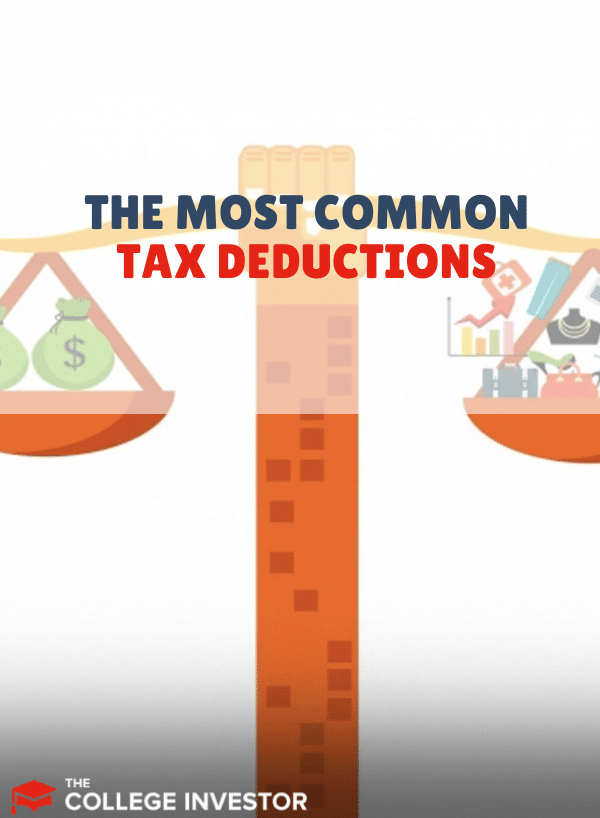
Tax time is almost here! More accurately, tax time is always here.
If you’re looking to maximize your savings and minimize your tax bill (legally), there are important things you need to understand and do today, so you can minimize your tax bill on April 15th.
Plus, if you're starting this early, you can plan accordingly!
Here are a few of the most common tax deductions that young people might miss on their tax forms.
Mileage Expenses for Your Side Hustle
Do you have a small business or a thriving freelance side hustle? If you’re self-employed in any capacity, you can legally deduct all legitimate business expenses. That includes:
- Communications expenses: Your business cell phone bill and your Internet expense may be deductible.
- Supplies: Printer ink, paper, pens, and other costs associated with running the business.
- Advertising: Your website, business cards, and any ads you run may count as business expenses.
- Business-related travel: Did you attend industry conferences or visit customers to complete a sale? These costs are deductible (including 50% of all meals eaten out during travel).
- Tangible property: Did you buy a cell phone, tablet, or computer for your business? If so, you can either depreciate these assets over time, or, in some cases claim the full cost as an expense the year that you buy it.
- Legal and accounting fees: Do you pay an accountant or bookkeeper (or pay for accounting software)? If so, be sure to deduct the expenses.
- Mileage expenses: Does your side hustle involve driving a car? If so, you can claim $0.58 per mile driven related to the expense. The trick with this deduction? You have to track your mileage throughout the year. These are the top apps for tracking your mileage.
Optimizing your business expenses is critical for minimizing your taxes. As a self-employed person, you have to pay 15.3% of your profits toward Social Security and Medicaid. Plus, you have to pay Federal, state, and city taxes on that profit. Every dollar you can legally claim as an expense will save you anywhere from $0.15 to $0.60 or more in taxes.
But the key to saving this money is tracking the expenses throughout the year. Use an app or bookkeeping software to track expenses and income. Keeping your business finances organized also has the added advantage of making it easier to estimate your quarterly taxes as a freelancer.
By the way, if you’re completely self-employed you may be able to claim your health insurance premiums as an adjustment to income (it lowers your expenses). Be sure to talk with an accountant to understand all the costs that may be deductible.
Itemized Deductions
In 2023, a single person can claim a standard deduction of $13,850, and a married couple (filing jointly) can claim a standard deduction of $27,700. Most people will claim the standard deduction, but if you’re a high-income earner, a homeowner, a major giver, or someone with outsized medical expenses, itemizing deductions may be the right move for you.
Here are a few of the major itemized deductions you can take:
- Charitable cash contributions: Itemize up to 100% of your adjusted gross income. While most givers aren’t approaching the limit, any giving to a 501(c)(3) organization can be itemized.
- State and local taxes: You can itemize up to $10,000 worth of state and local taxes including your property taxes, state income taxes, and city taxes.
- Mortgage interest: You can deduct all your mortgage interest on up to a $750,000 loan on your property (up to $1 million if you secured your loan before December 15, 2017). That includes upfront mortgage points.
- Medical expenses (over 10% of your income): Did you have a bad year for medical expenses (or perhaps you gave birth while on a relatively lower income)? Any medical spending (not including health insurance premiums) above 10% of your income can be deducted. If you’re earning $60,000 per year, and you spend $7,000 on medical expenses, you have $1,000 worth of itemized deductions. When you add that to the other deductions, you may find your tax bill lowered when you itemize.
Retirement Contributions
If you contribute money to a traditional IRA, or a workplace retirement plan such as a 401(k), 403(b), 457, or a self-employment plan (Individual 401(k) or SEP-IRA), these contributions can be made with pre-tax dollars. When you withdraw the money, you’ll have to pay income tax on them, but in the meantime, these contributions can help lower your tax bill.
When you combine the tax savings with the possibility of employer matches, retirement contributions become the ultimate in wealth-building tax deductions. If you’re self-employed, be sure to open your retirement account before the end of the year. You can contribute to it until the April 15th tax filing deadline.
Make sure you also keep up with the contribution limits:
Student Loan Interest (Even If Your Parents Paid It)!
Do you have student loans? If you’re paying interest on them, you may qualify for an “above-the-line” deduction of up to $2,500. An above-the-line deduction means you don’t have to itemize your deductions to qualify for this. You simply claim the deduction on your tax form (Form 1098-E), and your taxable income is lowered.
Note: Due to the Covid-19 forbearance, many individuals who may have had student loan interest in prior years may not have any to claim for 2022. The only exception would be the 5-10% of borrowers who electively made payments on their student loans.
Top Tax Credits for Young Adults
What’s better than a legal tax deduction? A legal tax credit.
In the eyes of the law, deductions reduce your income, thereby reducing the amount of tax you have to pay on the income.
Tax credits are even better. When you claim a tax credit you have a straight-up reduction to the amount of income tax you owe. Perhaps you owed $3,000 in income tax, but you can claim a $500 tax credit. In that case, your total tax burden falls to $2,500.
Earned Income Tax Credit
The Earned Income Tax Credit is a “refundable” tax credit that helps working Americans who have low income lower their tax burden or even boost their income (essentially through a negative tax).
The maximum credit amount is:
- $7,430 with three or more qualifying children
- $6,604 with two qualifying children
- $3,995 with one qualifying child
- $600 with no qualifying children
In years when you have a low income (for example, the first few years of college or when you’re starting a business) you may qualify for this credit.
A quick note on income: This is your adjusted gross income. So if you’re a super saver who contributes a ton of money to retirement accounts, you may qualify for this tax credit even if you’re earning a decent salary.
Header | Maximum Income If Claiming Zero Children | Maximum Income If Claiming One Child | Maximum Income If Claiming Two Children | Maximum Income If Claiming Three Children |
|---|---|---|---|---|
Single, Head of Household or Widowed | $17,640 | $46,560 | $52,918 | $56,838 |
Married Filing Jointly | $24,210 | $53,120 | $59,478 | $63,398 |
If you qualify for the credit, be sure to claim it on your tax form. Most tax software services allow you to claim the EITC using the free version of the software.
Education Credits
American Opportunity Tax Credit
Are you an independent adult paying your way through your first four years of higher education? If so, look out for the American opportunity tax credit. You need a Form 1098-T from your educational institution to claim the credit.
This credit allows you to claim a tax credit (meaning every dollar you owe in tax is offset by this expense) for 100% of the first $2,000 of qualified education expenses you paid for each eligible student. You can also offset up to 25% of the next $2,000 of qualified education expenses you paid for an eligible student.
If you don’t qualify for this credit, your parents probably will, so let them know about it.
Lifetime Learning Credit
Going back to school? If so, you may qualify for the lifetime learning credit. This credit allows you to have a dollar-for-dollar credit for up to $2,000 of educational expenses per year.
You can claim this credit if your modified adjusted gross income is less than $59,000 (filing as a single person). If you earn between $59,000 and $69,000, you will qualify for a partial credit. For married couples filing jointly, the required income is less than $118,000 with a phase-out credit between $118,000 and $138,000.
Saver’s Tax Credit
If you’re a lower-income earner who contributes to a retirement plan (including a Roth IRA, a traditional IRA, or any workplace plan), you could get a credit worth 50%, 20%, or 10% of your contribution up to $2,000 worth of contribution (so a maximum credit of $1,000). (Double the numbers for married couples who file a joint return.)
This is another one of those amazing credits for super savers who have a moderate gross income, but sock away a ton in retirement accounts.
As long as you’re not a full-time student, over 18, and can’t be claimed as a dependent (and of course, you make retirement contributions), this credit can be yours.
Credit Rate | Married Filing Jointly | Head of Household | All Other Filers* |
|---|---|---|---|
50% of your contribution | AGI not more than $41,000 | AGI not more than $30,750 | AGI not more than $20,500 |
20% of your contribution | $41,001 to $44,000 | $30,751 to $33,000 | $20,501 to $22,000 |
10% of your contribution | $44,001 to $68,000 | $33,001 to $51,000 | $22,001 to $34,000 |
0% of your contribution | More than $68,000 | More than $51,001 | More than $34,001 |
How to Claim a Deduction
If you qualify for one or more of these deductions, you can take steps to claim the deduction at tax time. Here are the steps to take.
Keep Good Records
It is up to you to keep track of any deductions you qualify for.
I recommend using a bookkeeping software program or an app to track your income and expenses associated with self-employment income. Be sure to upload pictures of your receipts so you don’t have to keep a literal shoe box with your expenses.
I also recommend keeping a “tax file” where you can store receipts from medical expenses, educational expenses, and debt repayments. Come tax time, it should be fairly easy to figure out your deductions.
Use Tax Software
Tax software makes it easy to claim deductions when you’re filing taxes. There is no reason to use pen and paper when you can use free or low-cost software to file your taxes.
Consider Consulting a Professional
Not everyone needs advice from a CPA. When you have a simple financial life, you can figure out tax deductions and credits on your own.
But as your financial and personal life become more complex, you may start to see the value in paying for professional advice. In particular, if you have multiple sources of income (rental properties, self-employment, traditional employment, etc.), and a higher income, professional advice can be well worth the price you pay.
Bottom Line
When you know about the tax code, you can work to arrange your finances to minimize your taxable income. These deductions and credits are 100% legal, so make a point to see whether you qualify.

Hannah is a wife, mom, and described personal finance geek. She excels with spreadsheets (and puns)! She regularly explores in-depth financial topics and enjoys looking at the latest tools and trends with money.
Editor: Clint Proctor Reviewed by: Robert Farrington
